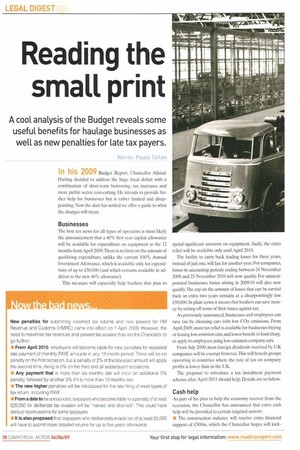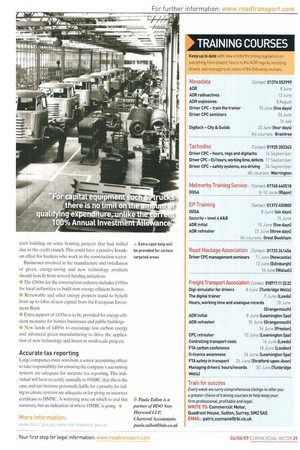Reading the small print
Page 28

Page 29

If you've noticed an error in this article please click here to report it so we can fix it.
A cool. analysis of the Budget reveals some useful benefits for haulage businesses as well as new penalties for late tax payers.
Worn: Paula iUor in his 2009 Budget Report, Chancellor Alistair Darling decided to address the huge fiscal deficit with a combination of short-term borrowing, tax increases and more public sector cost-cutting. He intends to provide further help for businesses but is rather limited and disappointing. Now the dust has settled we offer a guide to what the changes will mean.
Businesses
The best tax news for all types of operators is most likely the announcement that a 40% first year capital allowance will be available for expenditure on equipment in the 12 months from Apri12009. There is no limit on the amount of qualifying expenditure, unlike the current 100% Annual Investment Allowance, which is available only for expenditure of up to £50,000 (and which remains available in addition to the new 40% allowance).
This measure will especially help hauliers that plan to spend significant amounts on equipment. Sadly, the extra relief will be available only until April 2010.
The facility to carry back trading losses for three years, instead of just one, will last for another year. For companies, losses in accounting periods ending between 24 November 2009 and 23 November 2010 will now qualify. For unincorporated businesses, losses arising in 2009/10 will also now qualify. The cap on the amount of losses that can be carried back an extra two years remains at a disappointingly low £50,000. In plain terms it means that hauliers can save money by setting off some of their losses against tax.
As previously announced, businesses and employees can save tax by choosing cars with low CO2 emissions. From Apri12009, more tax relief is available for businesses buying or leasing low-emission cars, and lower benefit in kind charges apply to employees using low-emission company cars.
From July 2009, most foreign dividends received by UK companies will be exempt from tax.This will benefit groups operating in countries where the rate of tax on company profits is lower than in the UK.
The proposal to introduce a tax instalment payment scheme after April 2011 should help. Details are to follow.
Cash help
As part of his plan to help the economy recover from the recession, the Chancellor has announced that extra cash help will be provided to certain targeted sectors: • The construction industry will receive extra financial support of £500m. which the Chancellor hopes will kick start building on some housing projects that had stalled due to the credit crunch. This could have a positive knockon effect for hauliers who work in the construction sector.
Businesses involved in the manufacture and installation of green, energy-saving and new technology products should benefit from several funding initiatives: • The £500m for the construction industry includes 1100m for local authorities to build new energy-efficient homes • Renewable and other energy projects stand to benefit from up to 14bn of new capital from the European Investment Bank • Extra support of 1435m is to be provided for energy-efficient measures for homes, businesses and public buildings • New funds of £405m to encourage low carbon energy and advanced green manufacturing to drive the application of new technology and invest in small-scale projects
Accurate tax reporting Large companies must nominate a senior accounting officer to take responsibility for ensuring the company's accounting systems are adequate for accurate tax reporting. This individual will have to certify annually to HMRC that this is the case, and can become personally liable for a penalty for failing to ensure systems are adequate or for giving an incorrect certificate to HMRC A worrying note on which to end this summary, but an indication of where HMRC is going. 0
















































































































































